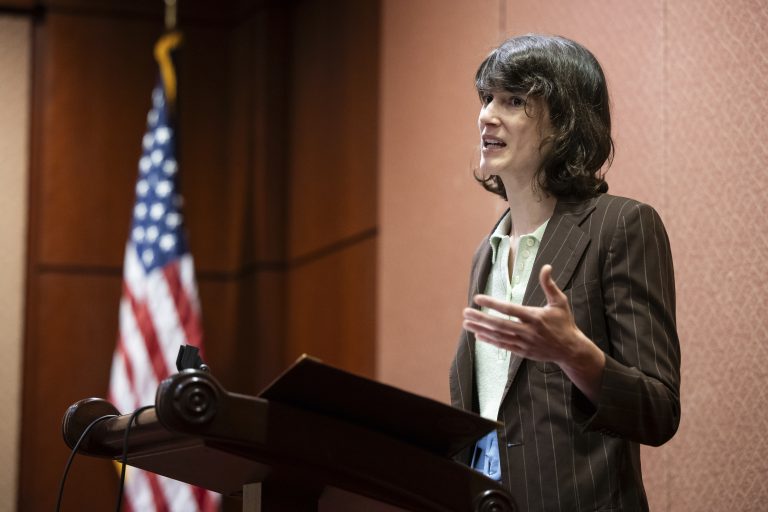The House is on track to rebuke a veteran Illinois lawmaker over a hardball political tactic — a move that has stirred intraparty anger at the fellow Democrat who prompted it.
The formal admonishment targets Rep. Chuy García, who announced his retirement earlier this month only after the candidate qualification period closed — all but assuring his chief of staff would succeed him in the solid blue Chicago district.
What has roiled Democrats is who forced the issue: Rep. Marie Gluesenkamp Perez of Washington, who introduced the rebuke Wednesday under a fast-track process bypassing House leadership. That she did so as House Democratic leaders moved to focus attention on GOP disarray on health care and the Jeffrey Epstein case has further exacerbated the tensions.
A vote to kill the disapproval resolution backed by House Democratic leaders failed on a 211-206 vote Monday, with Rep. Jared Golden of Maine being the only other Democrat joining Gluesenkamp Perez to proceed with the symbolic measure.
That tees up debate and a final vote as soon as Tuesday. Some Democrats granted anonymity to describe private conversations with colleagues said they expected many more defections on that vote.
“You don’t get your cake and eat it, too,” Gluesenkamp Perez said during a debate that followed the vote. “If you are not going to run, you don’t choose your successor — no matter the work you have done beforehand.”
Although some in the party privately disagreed with García’s decision to retire after only the filing deadline, many House Democrats bristled at Gluesenkamp Perez’s decision to call it up on a day when the party was attempting to project unity at the end of the record government shutdown.
Many also cited García’s own response, saying his decision to retire was based on his health and family needs. His office has forcefully pushed back against any accusations of wrongdoing, blasting out talking points to Capitol Hill offices Monday.
“There was absolutely nothing illegal or unethical,” said Rep. Hillary Scholten (D-Mich.). “This is entirely based on an assumption about what one member believes were his intentions, when in fact, he has clearly stated he needed the time to make up his mind, and he was going through a lot of personal difficulties in his life trying to decide if he was going to run again.”
García spoke out on his own behalf Monday night after the vote, saying that “our job comes second to the people waiting at home.”
“When a colleague chooses his family, that shouldn’t be a moment for division — it should be a moment for understanding and unity,” he said. “One day you might be the one making that choice, and you shouldn’t have to debate it on the House floor.”
But many in Democratic circles have spoken up on Gluesenkamp Perez’s behalf for calling out García for essentially hand-picking his successor, including Sen. Andy Kim of New Jersey and veteran Chicago political strategist David Axelrod. Purple-district Rep. Susie Lee (D-Nev.) said Monday she had “a lot of questions about the timing of what he did.”
Even those who defended García registered some distaste for how he engineered his departure from the House.
“I have tremendous sympathy for the family situation that Chuy has. I also think we have a long history [in Illinois] of greasing the skids for successors, which is not a good way for democracy to work,” said Rep. Sean Casten (D-Ill.). “But I don’t think that this is something that should really warrant the attention of the House.”
“I don’t think it was a long decision,” said Rep. Jan Schakowsky (D-Ill.), whose own retirement has kicked off a hotly contested primary, of García’s deliberations. “I don’t know if it was as short as it appears, either.”
Yet Democratic leaders firmly backed García, who remains popular with his Democratic colleagues. The Congressional Hispanic Caucus, of which García and Gluesenkamp Perez are both members, released a statement last week “in solidarity with” García. And House Minority Leader Hakeem Jeffries gave the 69-year-old his full-throated backing in comments to reporters Monday.
“He’s been a progressive champion in disenfranchised communities for decades, including during his time in Congress, and he’s made life better for the American people,” Jeffries said, adding that he believed the disapproval measure would be successfully tabled.
Gluesenkamp Perez, who represents a swing district and belongs to the moderate Blue Dog faction, has a much less cozy relationship with her colleagues. She had a testy confrontation with House Minority Whip Katherine Clark on the House floor after introducing her measure. Clark later told reporters that lawmakers “should be focused on the issue of health care.”
Gluesenkamp Perez has doubled down on her criticism of her fellow Democrats. In a CNN interview Sunday, she said she understood the desire to have a unified message as a party. But, she added, “When you see things like this … it’s not just about having affordable stuff or holding another team accountable, it’s that we want leadership. We want a team that calls a spade a spade.”
It’s not the first time she’s cut against her party. Earlier this year, she unsuccessfully attempted to add congressional ethics standards relating to cognitive ability to an appropriations bill. And she was one of a half-dozen Democrats who voted with Republicans to pass the funding bill ending the government shutdown.
Mia McCarthy contributed to this report.


